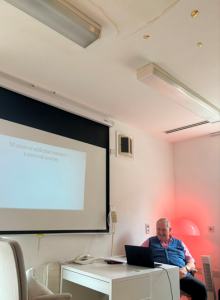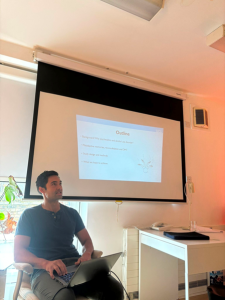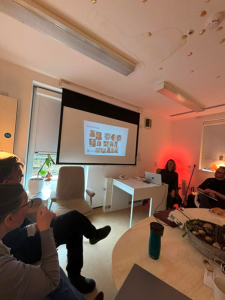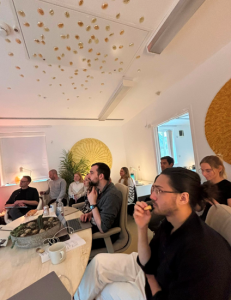Blog by Rayyan Zafar, Mark Sweeney, Orla Mallon, Research Postgraduates in the Department of Brain Sciences and Institute of Clinical Sciences
Psychedelic drugs, such as psilocybin, ketamine, DMT and LSD are the subject of increasing research as potential novel treatments for addiction. Some of the most innovative work is being conducted by researchers in the UK.
My colleagues and I organised the first colloquium on psychedelics in addiction research, which took place in May 2024 at the Centre for Psychedelic Research at Imperial College London. The event provided a space for leading researchers in the field to meet, present their work and identify opportunities for future collaboration between institutions. Attendees were present from Imperial College London, University of Exeter and UCL, with senior academics from each group presenting their work.
The conference started with a talk from Dr David Erritzoe and Prof David Nutt, two of the founders of the Centre for Psychedelic Research. They discussed their experiences of conducting research in addiction over their varied careers, the current treatments available and the potential which psychedelics, such as psilocybin, demonstrate as potential novel treatments followed by a talk by Dr Rayyan Zafar on the use of neuropsychopharmacology techniques in addiction research. Their talks sparked a discussion on the scale of unmet clinical need and knowledge gaps related to mechanism of action which provided an inspiring start to the day!
Next, Prof Ravi Das presented on his groups work at UCL. They discussed their work investigating dimethyltryptamine (DMT) on mood, language processing and memory functioning and an upcoming trial for alcohol use disorder. They also discussed the use of behavioural techniques such as reward memory reconsolidation that have previously been found to reduce drinking urges and drinking days following ketamine infusion in heavy drinkers and their plans to use similar paradigms with DMT in patients with AUD.
After lunch, Prof Celia Morgan and her team from the University of Exeter presented their work on the use of ketamine to reduce relapse in alcohol use disorder. They started with results from their completed KARE trial which provided an insightful discussion on the trial design and how this provided the basis for future work. They went on discuss the upcoming MORE-KARE trial – an investigation of ketamine-assisted psychological therapy in increasing abstinence in people with severe alcohol use disorder. It was incredibly valuable to hear experience from the team in setting up a large, multicentre study. On a personal note, it was inspiring to see how a concept had come from pre-clinical research to a large phase 3 study with nationwide recruitment, which could provide a much-needed treatment option for people with alcohol use disorder.
The final session explored options for collaboration in future research and provided a forum to transfer knowledge between our groups. Several areas for collaboration were identified, including developing and validating neuroimaging measures and exploring the views of participants, clinicians, and commissioners on bringing these treatments to the NHS. These discussions and collaborations are valuable to ensure that the specialist knowledge and expertise in each group is harnessed and built on.
The event concluded with a networking event and dinner which was a great way to round up the day and network in a more informal setting.
The event was a fantastic way to meet others working on similar research with the shared goal developing new treatments and therapies for addiction. Organising the event took a different set of skills to our usual research, but it was rewarding to present our work and identify potential areas which can be made more valuable through collaboration. All parties left feeling inspired, excited for several new meaningful opportunities for collaboration and looking forward to the next meeting!
The organisers would like to thank the Graduate School for providing sponsorship for this event.




Attendees